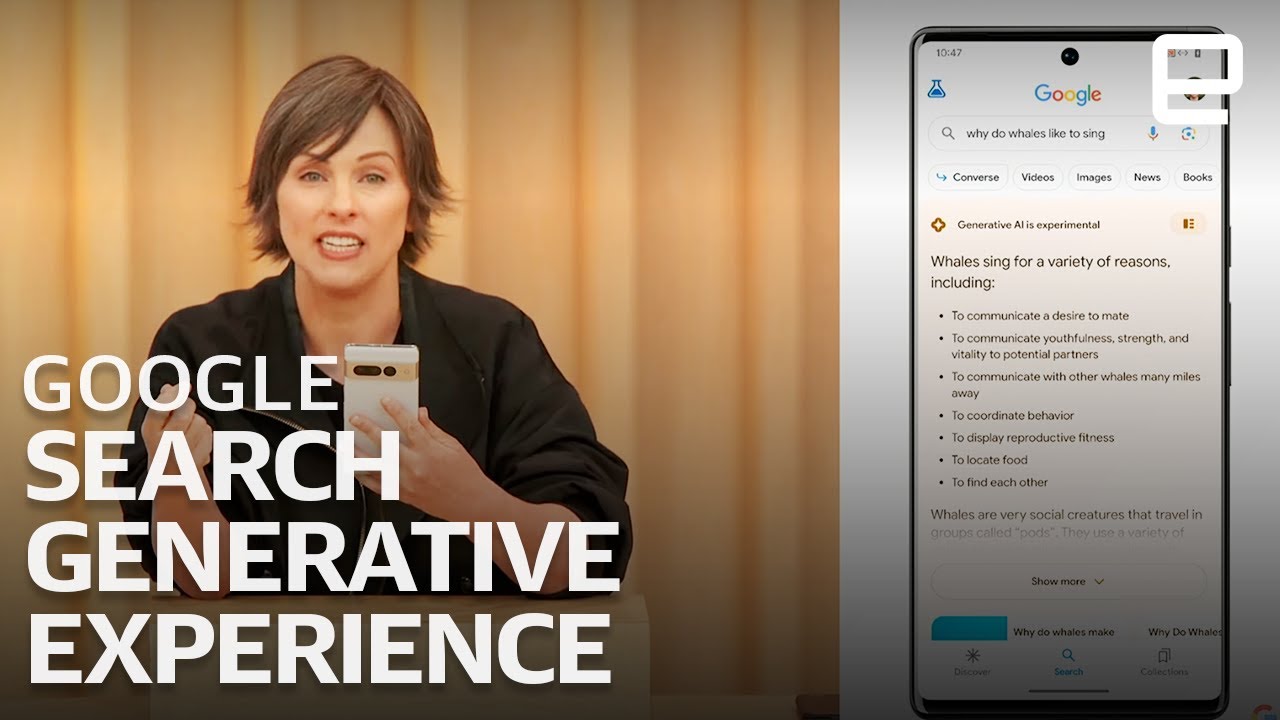Google Search has long been synonymous with efficient and accurate information retrieval. However, as technology advances, so does the need for more intelligent and interactive search experiences. Introducing the Google Search Generative Experience(GSGX), a revolutionary approach that takes search to a whole new level. Powered by advanced machine learning algorithms, GSGX leverages natural language processing, and generative models to provide users with personalized, conversational, and immersive search results. In this article, we delve into the world of GSGX, exploring its inner workings and the advantages it brings to users and contentcreators alike.
What Is Google Search Generative Experience?

New Google AI-Powered Search Engine Revealed
Google Search Generative Experience (GSGX) is an innovative technology introduced by Google to revolutionize the search experience. It utilizes advanced machine learning algorithms, specifically OpenAI's GPT-3.5 architecture, to generate dynamic and interactive search results. GSGX goes beyond traditional search methods by providing personalized, conversational, and immersive search experiences.
With GSGX, users can engage in natural language interactions with the search engine, asking follow-up questions, seeking clarifications, and requesting more information. The system maintains contextual understanding throughout the search session, allowing for a seamless and coherent conversational experience.
Instead of presenting static lists of links, GSGX generates rich snippets that include text, images, videos, and interactive elements, providing users with concise and informative summaries of the content. These generative search results are produced in real-time and are tailored to the individual user's preferences, delivering a more personalized and relevant search experience.
GSGX continuously learns from user interactions and feedback, leveraging the vast amount of data available on the web and the expertise of Google's search engineers. This continual improvement ensures that GSGX becomes increasingly accurate and helpful over time, refining its understanding and delivering more refined search results.
Purpose Of Google Search Generative Experience

Search Generative Experience at Google I/O 2023 in under 3 minutes
The purpose of Google Search Generative Experience (GSGX) is to enhance the search experience for users by providing a more personalized, interactive, and dynamic approach to information retrieval. GSGX aims to go beyond traditional search methods and deliver a search experience that is tailored to the individual user's needs and preferences.
One of the key objectives of GSGX is to enable natural language interaction between users and the search engine. Instead of rigidly searching for keywords or phrases, GSGX allows users to engage in conversational exchanges with the search engine, just as they would in a real conversation. Users can ask follow-up questions, seek clarifications, and request more information, leading to a more interactive and engaging search experience.
Another important purpose of GSGX is to provide dynamic and generative search results. Rather than presenting static lists of links, GSGX generates rich snippets that can include text, images, videos, and interactive elements. These snippets are generated in real-time and provide concise and informative summaries of the content, making it easier for users to quickly grasp the relevant information.
GSGX also aims to maintain contextual understanding throughout the search session. It remembers previous questions, responses, and user preferences, ensuring a coherent and seamless conversation. This contextual understanding enables more accurate and personalized search results, as GSGX takes into account the ongoing context when generating responses.
Additionally, GSGX continuously learns from user interactions and feedback. It leverages the vast amount of data available on the web, user behavior patterns, and the expertise of Google's search engineers to improve its understanding and deliver increasingly accurate and helpful search results over time.
How Does GSGX Work?
Google Search Generative Experience (GSGX) leverages advanced machine learning algorithms, specifically OpenAI's GPT-3.5 architecture, to provide a unique and immersive search experience. Here is a simplified breakdown of how GSGX works:
- User Query Analysis -When a user enters a search query, GSGX analyzes the text using advanced language models. It takes into account the context, user intent, and other relevant factors to understand the query comprehensively.
- Generative Search Results -GSGX employs generative algorithms to produce dynamic search results. Instead of a static list of links, users are presented with rich, interactive snippets that provide concise and informative summaries of the content. These snippets can include text, images, videos, and even interactive elements. GSGX generates these snippets in real time based on the user's query and preferences.
- Natural Language Interaction -GSGX encourages natural language interaction between the user and the search engine. Users can ask follow-up questions, seek clarifications, or request more information, just as they would in a conversation. The system adapts to the user's preferences and provides relevant answers based on the ongoing context.
- Contextual Understanding -GSGX has the ability to maintain context throughout the search session. It remembers previous questions, responses, and user preferences, allowing for a seamless and coherent conversational experience. This contextual understanding enables more accurate and personalized search results, as GSGX takes into account the ongoing conversation when generating responses.
- Continuous Learning -GSGX learns from every interaction and search session, improving its performance over time. It leverages the vast amount of data available on the web, user feedback, and the expertise of Google's search engineers to continually enhance its understanding and generate more accurate and helpful results.
Google Search Generative Experience Vs Traditional Search
Google Search Generative Experience (GSGX) differs from traditional search methods in several significant ways. Here are some key differences:
- Interactivity -GSGX offers a more interactive search experience compared to traditional methods. Instead of simply providing a list of static links, GSGX encourages natural language interaction between the user and the search engine. Users can ask follow-up questions, seek clarifications, and engage in a conversation-like interaction with the system.
- Generative Search Results -Unlike traditional search methods that present static search results, GSGX generates dynamic and generative search results. It produces rich snippets that include text, images, videos, and interactive elements, providing users with concise and informative summaries of the content. These snippets are generated in real time based on the user's query and preferences.
- Contextual Understanding -GSGX maintains contextual understanding throughout the search session. It remembers previous questions, responses, and user preferences, ensuring a coherent and seamless conversation. This contextual understanding enables GSGX to provide more accurate and personalized search results that align with the ongoing context of the user's queries.
- Personalization -GSGX focuses on delivering a personalized search experience. It takes into account the user's preferences, search history, and ongoing conversation to tailor the search results according to individual needs. This personalized approach enhances relevance and helps users find information that is specifically suited to their requirements.
- Continuous Learning -GSGX continuously learns and improves over time. It leverages user interactions, feedback, and the expertise of search engineers to enhance its understanding and generate more accurate and helpful results. This continual learning process ensures that GSGX evolves and adapts to changing user needs, providing increasingly refined search experiences.
Advantages Of Google Search Generative Experience
Google Search Generative Experience (GSGX) offers several advantages that enhance the search experience for users. Here are some key advantages of GSGX:
- Personalization -GSGX provides a personalized search experience tailored to individual users. It takes into account user preferences, search history, and ongoing conversations to deliver search results that align with their specific needs and interests. This personalization enhances relevance and helps users find information that is more meaningful to them.
- Interactivity -GSGX promotes natural language interaction between users and the search engine. Users can ask follow-up questions, seek clarifications, and engage in a conversation-like interaction. This interactivity creates a more engaging and immersive search experience, allowing users to obtain the information they need in a more intuitive and interactive manner.
- Dynamic and Generative Search Results -Unlike traditional search methods that provide static lists of links, GSGX generates dynamic and generative search results. It produces rich snippets that include text, images, videos, and interactive elements, providing users with concise and informative summaries of the content. This visually appealing and interactive presentation enhances user engagement and facilitates a quick understanding of the search results.
- Contextual Understanding -GSGX maintains contextual understanding throughout the search session. It remembers previous questions, responses, and user preferences, enabling a seamless and coherent conversation. This contextual understanding allows GSGX to provide more accurate and relevant search results that align with the ongoing context of the user's queries.
- Continuous Learning and Improvement -GSGX continually learns from user interactions and feedback, as well as from the expertise of Google's search engineers. It leverages this knowledge to improve its understanding, accuracy, and relevance over time. This continuous learning process ensures that GSGX evolves and adapts to user needs, providing increasingly refined and helpful search experiences.
Disadvantages Of Google Search Generative Experience
While Google Search Generative Experience (GSGX) offers numerous advantages, it's important to consider potential disadvantages as well. Here are a few limitations or challenges associated with GSGX:
- Misinterpretation of Queries -Due to the complexity of natural language understanding, GSGX may occasionally misinterpret user queries. It might generate inaccurate or irrelevant search results, leading to frustration and potentially impacting the user experience.
- Overreliance on Generative Models -GSGX heavily relies on generative models to generate search results. While these models are powerful, they are not flawless and can sometimes produce misleading or biased information. Care must be taken to ensure the accuracy and reliability of the generated content.
- Lack of Transparency -The underlying algorithms and processes employed by GSGX may lack transparency, making it challenging for users to understand how search results are generated. This lack of transparency may raise concerns about data privacy, algorithmic biases, and the influence of commercial interests on search results.
- Limited Domain Expertise -GSGX's generative models might struggle to provide accurate information in highly specialized or niche domains. The system's ability to generate relevant and accurate search results may be more limited compared to traditional search methods in these specialized areas.
- Training Data Biases -The generative models used by GSGX are trained on large amounts of data from the web, which may contain inherent biases. These biases can inadvertently influence the search results and contribute to the propagation of misinformation or reinforce existing biases present in the training data.
- Dependency on Internet Connection -GSGX heavily relies on an active Internet connection to provide search results. If the connection is weak or disrupted, the user's ability to interact with GSGX and access search results may be compromised.
The Future Of Search

What's next for AI and Google Search | Google I/O 2023
The future of search is poised to be an exciting and transformative journey, driven by technological advancements and evolving user expectations. Here are some key trends and possibilities that can shape the future of search:
- Artificial Intelligence and Machine Learning -Artificial intelligence (AI) and machine learning (ML) will continue to play a pivotal role in the evolution of search. Advanced algorithms will enable search engines to better understand user intent, context, and preferences, resulting in more accurate and personalized search results. AI-powered assistants will become even more sophisticated in interpreting and responding to natural language queries, offering a conversational search experience.
- Voice and Visual Search -Voice search has gained significant momentum with the widespread adoption of virtual assistants and smart speakers. In the future, voice search is expected to become more prevalent, allowing users to interact with search engines using natural language commands. Similarly, visual search, powered by computer vision technology, will enable users to search for information by simply capturing images or using augmented reality (AR) applications.
- Contextual and Personalized Search -The future of search will be increasingly tailored to individual users. Search engines will leverage user data, preferences, and behavior patterns to deliver highly personalized search results. Contextual understanding will play a crucial role, as search engines will consider the user's location, browsing history, and other relevant factors to provide more relevant and timely information.
- Augmented Reality (AR) and Virtual Reality (VR) -AR and VR technologies will revolutionize the way we interact with search results. Users will be able to visualize information in three-dimensional spaces, explore immersive virtual environments, and access augmented information overlays in real-world scenarios. AR and VR will enable enhanced product visualization, interactive learning experiences, and virtual tours, transforming the search experience into a more immersive and interactive journey.
- Semantic Search and Natural Language Processing -Search engines will continue to improve their understanding of natural language and context. Semantic search, which focuses on understanding the meaning behind words and phrases, will enable search engines to deliver more accurate and contextually relevant results. Natural language processing advancements will enable search engines to better interpret complex queries and provide concise and helpful answers.
- Cross-Platform and Omnichannel Integration -Search will become seamlessly integrated across multiple platforms and devices. Users will be able to start a search on one device and continue it on another, with search results and preferences synchronized across devices. Additionally, search engines will integrate with various channels and platforms, including social media, messaging apps, and smart home devices, providing a unified and consistent search experience.
- Ethical and Transparent Search -As search engines continue to evolve, there will be an increased emphasis on ethical and transparent search practices. Efforts will be made to address biases, ensure user privacy, and provide transparent explanations of search algorithms and ranking criteria. Search engines will strive to deliver unbiased and trustworthy information while empowering users to make informed decisions.
People Also Ask
Can Google Search Generative Experience Understand Complex Queries?
Google Search Generative Experience is designed to understand complex queries. It utilizes advanced natural language processing and machine learning algorithms to comprehensively analyze user queries and provide relevant and accurate search results.
Will Google Search Generative Experience Replace Traditional Search Algorithms?
Google Search Generative Experience is not intended to replace traditional search algorithms. Instead, it complements existing search methods by providing an additional interactive and personalized search experience for users who prefer a more conversational and immersive approach.
How Does Google Search Generative Experience Improve Over Time?
Google Search Generative Experience improves over time through continuous learning. It leverages user interactions, feedback, and the expertise of search engineers to enhance its understanding, accuracy, and relevance, ensuring increasingly helpful and personalized search results.
Conclusion
The Google Search Generative Experience (GSGX) represents a significant leap forward in the realm of information retrieval. Content creators also benefit from GSGX, as it enhances their discoverability and allows for more interactive and immersive showcasing of their work.
As Google continues to innovate and refine GSGX, the future of search looks even more promising, with endless possibilities for enhancing how we find and interact with information online. The era of the Google Search Generative Experience has arrived, revolutionizing the way we search and explore the digital universe.
